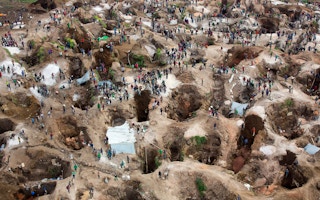The vast majority of companies that mine copper, lithium and other minerals used in solar panels, wind turbines and battery-powered cars are riddled with exploitation, a new study has found.
To continue reading, subscribe to Eco‑Business.
There's something for everyone. We offer a range of subscription plans.
- Access our stories and receive our Insights Weekly newsletter with the free EB Member plan.
- Unlock unlimited access to our content and archive with EB Circle.
- Publish your content with EB Premium.
The analysis, by international non-governmental organisation Business & Human Rights Resource Centre, shows that efforts to power societies using non-polluting sources are mired in human rights violations and destructive environmental practices.
With explosive growth in demand expected for the minerals as the world ramps up its renewable energy capacity, firms and governments must step up to protect workers risking their lives in toxic and perilous working environments in countries such as Chile, Zambia and the Democratic Republic of the Congo, the centre said.
The demand for minerals could increase nine-fold by 2050, with the fastest rises projected for lithium (965 per cent) and cobalt (585 per cent), a mineral critical for electric vehicle batteries as well as solar and wind power.
Nearly nine in 10 of the top mineral mining companies have been linked to human rights violations since 2010, the centre’s analysis showed. Other misdeeds among the 167 allegations made against 37 companies include the denial of access to water, violation of environmental regulations and displacement of local communities.
The widespread disregard of indigenous people’s rights or labour rights is at odds with human rights policies published by the majority of companies analysed. This suggests that they are either insufficient or lack adequate enforcement in supply chains.
Among the companies identified are Switzerland-headquartered Glencore, Brazil-headquartered Vale, China’s Jiangxi Ganfeng Lithium and China Molybdenum and Japan’s Sumitomo Corporation.
The regions that chalked up the most allegations were Africa, South America and Asia Pacific.
Mining minerals in fragile places
While over one-third of the biggest mineral companies do not have sufficient policies preventing abuse, the failure to translate existing regulations into practice is the bigger reason for violations, said Eniko Horvath, senior researcher at Business & Human Rights Resource Centre.
Governments in some source countries often place profits above their responsibility to citizens, leading the mining firms to act with impunity and escape accountability for crimes committed, she said.
Many reserves of rare earth minerals are also found in states perceived to be corrupt or fragile, making it more likely that their extraction will cause grievances, tensions or even violence, according to the Fund for Peace, an American research institution.
“
This is an opportunity for the clean energy sector that will determine whether its human rights legacy will differ from that of the fossil fuel sector.
Eniko Horvath, senior researcher, Business & Human Rights Resource Centre
New mining operations can shift social and economic dynamics when workers and business owners from other towns stream in searching for opportunities, said Natalya Lozovaya, consultant at Corporate Citizenship in London, an advisory firm specialising in sustainability and corporate responsibility.
If not managed well by the company in partnership with local government and other organisations, this can result in a rise in alcoholism, anti-social behaviour, prostitution or child labour, creating a higher risk that human rights will be violated, she told Eco-Business.
Poverty also increases the risk of exploitation and child labour, she said.
Playing dirty can come at a cost
The analysis is the latest report of the clean energy industry playing dirty.
A report in July by Global Witness revealed that of the 164 environment and land defenders killed in 2018, 17 lost their lives protesting against hydropower projects.
And when it comes to attacks on human rights defenders, the violation of indigenous people’s rights and child labour, the renewable energy sector is the third-worst, coming in only behind the mining and agribusiness sectors, another study by the Business & Human Rights Resource Centre in July found.
“Renewable energy technologies are key for our fight against climate change. However, for these technologies to be sustainable in both the environmental and social sense of the word, companies and investors moving into renewable energy must do so with a holistic view of the sector’s impacts,” said Horvath.
“
With the rise of social media and greater awareness of human rights issues, companies increasingly have to win over investors and communities by showing that they bring positive benefits beyond profits.
Natalya Lozovaya, consultant, Corporate Citizenship London
Firms with exploitative practices risk costly project delays and lost productivity from local opposition, legal action and reputational damage, she added.
“With the rise of social media and greater awareness of human rights issues, companies increasingly have to win over investors and communities by showing that they bring positive benefits beyond profits. Otherwise, they risk scandals, negative press and diminished business opportunities,” added Lozovaya.
Investors and governments can help by strengthening regulations, demanding higher human rights standards and ensuring that financial flows are not directed where they inadvertently fuel exploitation, Horvath told Eco-Business.
The Business & Human Rights Resource Centre’s new transition minerals tracker tool aims to provide data to investors, businesses and civil society groups to inform decisions and improve business practices.
Businesses and investors in clean energy must leave a better legacy than the fossil fuel industry, said Horvath.
“This is an opportunity for the clean energy sector that will determine whether its human rights legacy will differ from that of the fossil fuel sector,” she said.

















